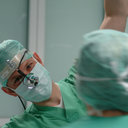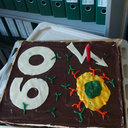Dose-dependent deterioration of swallowing function after induction chemotherapy and definitive chemoradiotherapy for laryngopharyngeal cancer.
Keywords
Abstract
OBJECTIVE
To evaluate the influence of clinical, treatment- and dose-dependent factors on posttreatment swallowing function after induction chemotherapy and definitive chemoradiotherapy in a group of homogeneously treated laryngopharyngeal cancer patients.
METHODS
From 28 May 2008 to 15 February 2013, 45 patients with borderline inoperable laryngopharyngeal cancer that had responded well to induction chemotherapy were treated with definitive chemoradiotherapy. Median follow-up was 22 months. Swallowing function and clinical data were prospectively analyzed using the EORTC QLQ-C30 questionnaire. Swallowing structures were retrospectively delineated on the original treatment planning CT. Dose-volume histograms were calculated for swallowing structures and Dmean, Dmax and V50-V64 values (in 2 Gy increments) were determined for each patient. Tumor volume and infiltration of the swallowing apparatus was defined by CT before induction chemotherapy.
RESULTS
Of the 45 patients, 26 (57.8 %) fully regained swallowing function after chemoradiotherapy. A further 12 patients (26.7 %) were able to manage soft, pureed and/or liquid foods; the remaining 7 (15.6 %) were completely dependent on percutaneous endoscopic gastrostomy (PEG). Posttreatment swallowing function was significantly influenced by Dmean to the superior pharyngeal constrictor muscle (PCM, p = 0.041). Correlations between late dysphagia and dose-volume relationships in the superior PCM and soft palate were also observed, which were significant from V60 (p = 0.043) and V58 for the soft palate and superior PCM, respectively. Of the evaluated clinical and tumor-related factors, only alcohol abuse (p = 0.024) had an influence on posttreatment swallowing function.
CONCLUSIONS
Almost 50 % of patients had deterioration of swallowing function after definitive chemoradiotherapy for laryngopharyngeal cancer. The dose to anatomical structures responsible for swallowing function appears to play a role. Therefore, in selected patients, target volume delineation for radiotherapy of laryngopharyngeal cancer should be optimized on an individual basis to spare the swallowing apparatus.



